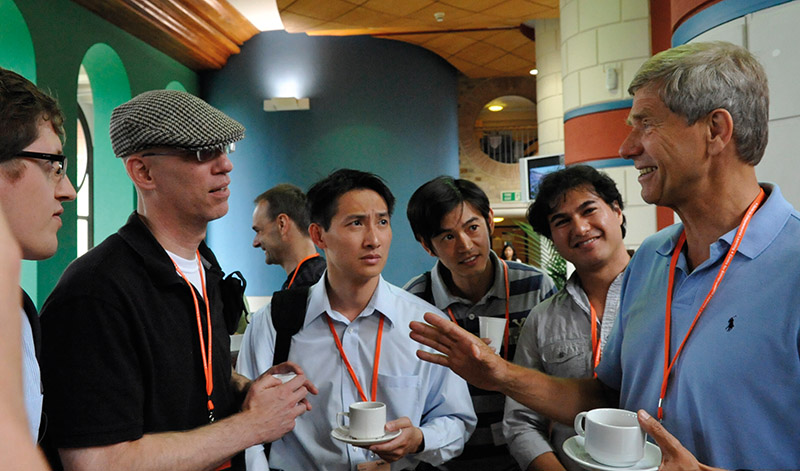That our city is an internationally renowned hotbed of enterprise and innovation is no secret. Cambridge is a world leader in the fields of science and high technology, producing some 5,000 technology companies since 1960 and a staggering 68.9 patents per 100,000 of population annually (the UK average is 4.60). The city has been home to some of the UK’s most illustrious entrepreneurs, from Clive Sinclair to Mike Lynch, as well as producing a clutch of firms at the forefront of the UK’s technology sector.
In addition to the continual influx of fresh talent from the university and a relatively small size (perfect for networking and fruitful chance encounters), what Cambridge also has working in its favour is a well-established entrepreneurial infrastructure. Blazing the trail in 1960, Cambridge Consultants are now joined by a host of consultancy companies able to tend to the needs of new companies looking to take their products to market. Meanwhile the arrival of St John’s Innovation Centre in the 1980s and more recently the Future Business Centre offer not only bricks and mortar premises for start-up companies, but also a culture of resource-sharing and support, allowing them to act as thriving incubation centres for new businesses.
Feeding into and nurturing this bubbling ecosystem of innovation and successful start-ups in the city is the Centre for Entrepreneurial Learning (CfEL), which this year celebrates its tenth anniversary. Launched in 2003 with an aim of spreading the ‘spirit of enterprise’, the Centre is housed within Trumpington Street’s Judge Business School, one of the departments of the University of Cambridge’s School of Technology.
It was born as a result of the UK government, at the time under Gordon Brown, taking steps to stimulate entrepreneurship within universities; part of an evolution of policies that gradually migrated from focusing on SMEs to focusing on entrepreneurship. The Cambridge response to the call for proposals resulted in setting up two institutions – the first centred around technology commercialisation, which grew out of the central admin of the university, and the second centring around teaching and training, which became CfEL.
“What we wanted to do was create a portfolio of education that could inspire, inform and then help people implement their goals,” explains CfEL director, Dr Shailendra Vyakarnam MBA. “We recognise that the primary purpose for students to come to Cambridge is to study their chosen subject, so entrepreneurship has to sit on top of that as a route for careers, taking research ideas to market or simply to raise awareness.” Central to CfEL’s ethos is that the best people to teach entrepreneurs are entrepreneurs themselves, a philosophy which has led to the establishment of a network of more than 350 experienced practitioners from the world of business, able to share their expertise and experiences through mentoring, lectures and providing feedback on students’ business plans and ideas.
Central to CfEL’s ethos is that the best people to teach entrepreneurs are entrepreneurs themselves
“The best person to teach music is a musician, the best person to teach dance is a dancer and subjects like medicine, law and other professions are best taught by those in that profession,” says Dr Vyakarnam, when asked why this is such an important facet of CfEL’s approach.
“Entrepreneurship is no different in that it requires a mix of skills, knowledge, motivation and connections that are best offered by practitioners. Learning from those who have done it before has much greater credibility and there is potential to transfer tacit knowledge. “Having said that, academic faculty play a very important role in defining the learning methods, syllubi, setting context and providing content and resources. Without this balanced delivery the risk of having ‘practitioners only’ as a delivery method is that you get the ‘Frank Sinatra School of Enterprise’… I did it my way!’”
A belief sometimes bandied about in the business world is that entrepreneurial ability is not, in fact, a ‘skill’ which can be taught, rather that success comes through some combination of a great idea, a lot of hard work, a fair bit of luck and perhaps even the innate characteristics or traits of a specific individual.
“Maybe that is true,” muses Dr Vyakarnam when quizzed on the matter. “But it can be learnt and internalised depending on what the individual wants to do. There are some people for whom being an entrepreneur comes naturally, but for the vast majority there are three interlinked behaviours that need to come together.
“The entrepreneur needs the social skills to build teams, manage networks, time, presentations, negotiations and make sales. Secondly, and importantly, they need self- awareness. Why is he or she doing this? What are the personal circumstances? Is the idea or opportunity big enough to get excited? With motivation the ‘radar’ is switched on and entrepreneurial ability kicks in!
“Finally, an entreprenuer needs business know-how. If you want to go into business – whatever it is – you need to know how it works. This means a window cleaner needs to know how to clean windows, find customers, charge the right amount of money, keep track of all this and ensure he or she pays the taxes and so on.”
 Imbuing potential entrepreneurs with this know-how is central to the teaching at CfEL, which has a strong focus on practical learning and enabling individuals to develop their own ideas and build self-confidence, linking them with business angels, academics, venture capitalist companies, development agencies, alumni communities and other institutions to equip them with the contacts and skills they need in order to progress their business idea into a commercial arena. The programmes on offer at CfEL range from sessions of one evening per week through to a 12-month part-time post- graduate diploma, catering for everybody from postgraduate students considering their future career paths to senior-level managers in any given industry sector.
Imbuing potential entrepreneurs with this know-how is central to the teaching at CfEL, which has a strong focus on practical learning and enabling individuals to develop their own ideas and build self-confidence, linking them with business angels, academics, venture capitalist companies, development agencies, alumni communities and other institutions to equip them with the contacts and skills they need in order to progress their business idea into a commercial arena. The programmes on offer at CfEL range from sessions of one evening per week through to a 12-month part-time post- graduate diploma, catering for everybody from postgraduate students considering their future career paths to senior-level managers in any given industry sector.
Enterprise Tuesday is a series of free evening lectures which aims to introduce participants – be they students, university staff or members of the local business community – to the world of enterprise, as well as encouraging individuals to pursue their entrepreneurial ambitions. It’s a hugely popular initiative, attracting some 250 attendees per week, and has provided a blueprint for similar schemes at academic institutions and corporations around the country.
Another core programme at CfEL is Ignite: an intensive one-week training programme for aspiring tech entrepreneurs and corporate innovators which combines practical teaching sessions with expert clinics, mentoring and advice from leading entrepreneurs – the goal being to transform a technology idea into a successful business. Ignite, the next instalment of which takes place in July 2015, boasts some impressive stats, with over 170 technology- based business ideas created by the course’s alumni currently in operation, more than £120 million in funding raised for ventures and over 2500 jobs created between 2011 and 2013 alone.
The most comprehensive of the courses offered at CfEL is the year-long Postgraduate Diploma in Entrepreneurship, a highly practical programme designed specifically for entrepreneurs to enable new ventures through a relevant learning experience which covers everything from opportunity recognition and idea evaluation to managing the early stages of a new venture.
“CfEL has grown to become a significant player in Cambridge and more widely through building its portfolio of courses,” says Dr Vyakarnam when asked about the future aspirations of the Centre.
“We have to recognise though that there are two major changes taking place. The first is the role of the media: programmes such as Dragons Den mean that more people are getting informed via the media without having to engage in deeper learning. We have to be able to respond to that by building online versions of some of what we do.
Programmes such as Dragons Den mean that more people are getting informed via the media without having to engage in deeper learning
“We also have to be able to reach out to bigger numbers. One of our experimental platforms that has now become a flagship is our Postgraduate Diploma in Entrepreneurship where some 60{b486c5a37ab2d325d17e17d701cb2567b1ecd1814e8ceb33effa2a4f1f171d46} is online, including the mentoring by entrepreneurs. This looks set to grow into a significant programme.
“The other direction on which we need to focus is to help provide education about entrepreneurship to more people within the University so that even more of the ideas can come to market via the Cambridge Judge Business School Accelerator,” he says. One thing’s for sure: with over 300 business ventures already created by CfEL alumni and Cambridge itself continuing to flourish and provide a fertile breeding ground for new start-ups, the future of this innovative institution looks very bright.

